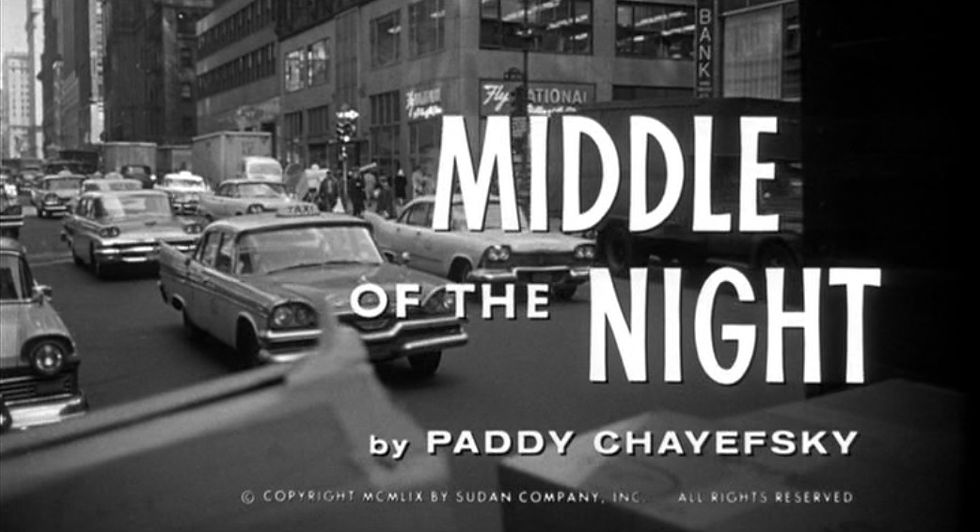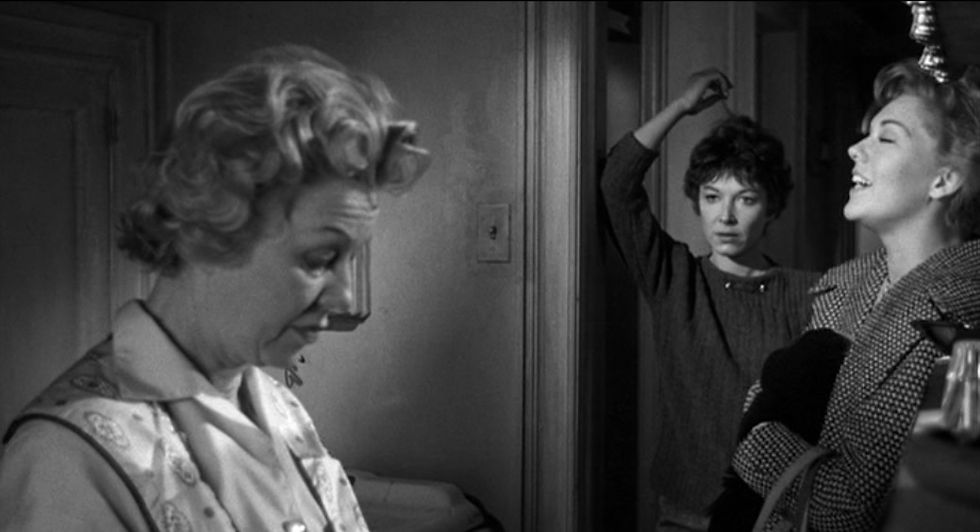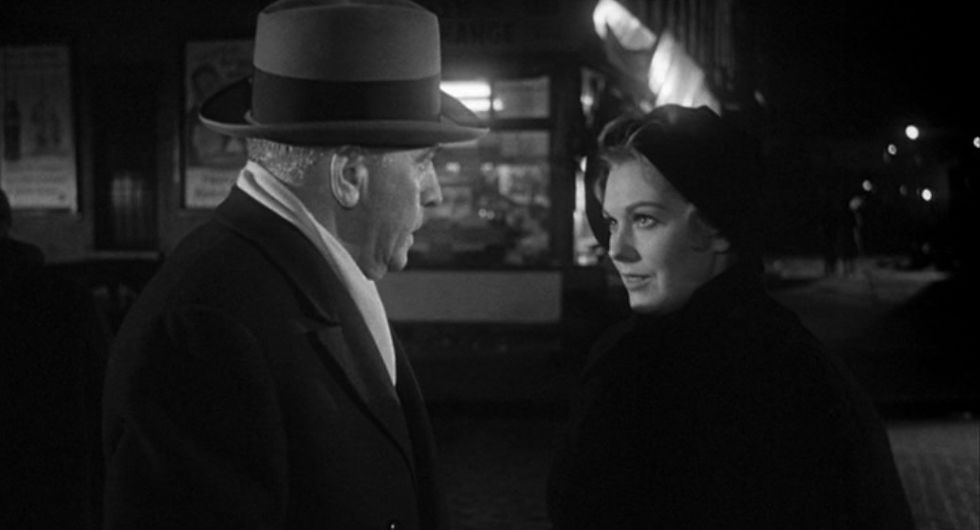It's Fredric March: Middle of the Night (1959)
- Samantha Glasser

- Mar 11, 2022
- 7 min read
In the Northern Hemisphere, March is typically thought of as the month when Winter transitions to Spring. We’re movie-obsessed, so March means Fredric March, the actor who transitions from Jekyll to Hyde. This year marks his 125th anniversary, so we’re dedicating March to the versatile leading man.

SAMANTHA GLASSER: Middle of the Night is a study of and aging widower seeking love for a second time. Jerry Kingsley manufactures and sells ready-to-wear clothes in New York City. He recently became a grandfather and finds it difficult to reconcile his new role in life on the other side of middle age.

RODNEY BOWCOCK: The film opens with this beautiful tracking shot through the streets of New York that sets a sort of melancholy tone for the proceedings. There is no real glamour here, the garment shop in which the main characters Betty and Jerry work seems very claustrophobic. There is no natural light, and it is here that we are introduced to what, in modern tastes seems to be a genuinely awful working environment. Jerry is a bitter widower, who is clearly unsure of his place in society. Walter (Albert Dekker) is an enthusiastic womanizer, convinced on some level that the other middle-aged men in the office will be titillated at his lecherous tales of dating and seducing various “tootsies” on a nightly basis.
SG: Betty (Kim Novak) works in Jerry's office at reception, fending off delivery boys who defy the posted signs to flirt with the pretty blonde, and Jerry's partner Walter who would be fodder for a major sexual harassment suit today.

RB: One day, Betty, a 24 year-old divorcee has enough of all of this nonsense and leaves the office in what we would recognize as an anxiety attack. When Jerry stops by her mother’s apartment where she lives to pick up some paperwork, he actually listens to her problems. Something that it’s apparent very few people in Betty’s life are willing to do. This institutes a sweet friendship that eventually develops into something more, as the two lonely people become more reliant on each other emotionally, and eventually physically.
SG: This is a dense film, the kind of thing you think of when you think of the late 50s and the Actors Studio. It features a variety of richly crafted characters, serious themes, and not a lot of laughter. That doesn't mean joy is absent, but overall it is a serious movie. Unlike imitators from later years, this movie is thoroughly engaging and not a moment is wasted. Middle of the Night was screened at the Cannes Film Festival. It is based on a stage play by Paddy Chayefsky of Marty fame. Edward G. Robinson and Gena Rowlands played the lead roles on Broadway.

RB: It is a dense film for sure. I had mentioned the claustrophobia of the factory, but really every location is claustrophobic. Betty’s living conditions aren’t much better than the factory. We see her getting ready for dates with Jerry, while her mother (Glenda Farrell) complains constantly to neighbor women about how fruitless it is to attempt to raise children, while Betty’s seventeen year old sister stands in the background chain-smoking. She barely speaks, but her presence adds to the closeness of everything. Like Betty, you can’t wait to escape those close quarters.

SG: Even though I like both characters, I don't believe that Jerry and Betty are truly in love with each other. Jerry wants companionship and youth, and Betty wants to be wanted, and wants to establish a stable life in a time when her future seems uncertain. She has been pushed by society, her ex-husband and her mother to be something she has not achieved, so she is lost, confused and unhappy. However, in the scene with her neighbor (Lee Grant) we get a glimpse of the real Betty. She isn't in love with Jerry, but he makes her feel good about herself because she has the power to make him happy. They don't communicate well, so even though they're attracted to pieces of each other, they don't really know each other, and Betty doesn't really know herself. Rather they're a couple of lonely souls grasping for happiness, but it is clear their future isn't bright. I can almost justify Jerry's decision to jump into a marriage with a woman he barely knows because he feels death looming. My mom was friends with a married couple who were together for close to 50 years when Evelyn died. Not very long after her death, Tom met another woman and they got married. My mom was slightly offended by how quickly he decided to get married again, and Tom, who was in his 80s explained that at his age, he didn't have time to wait. Betty's motivations are harder to explain. She is foundering and directionless, so rather than thinking logically about the situation, she jumps in without planning for the future, hoping to jump into something lasting this time since her first marriage failed.

RB: I agree. It’s hard to actually feel that they’re in love with each other, but one does get the sense that they are content with each other, which one could argue is enough, and certainly seems to be at that this juncture for Jerry and Betty. When compared to the pathetic, locker-room tales of Walter’s encounters with sex workers it certainly could be worse.
When they bury me, they can put on the gravestone, "This was a big waste of time."
SG: Rahma Maughan for Screenland Plus TV Land wrote, "March is magnificent, human and believable in his frailties and strength, and because of him, the final moments are a rich experience. This has great dignity and purpose, with none of the needless groveling in emotional dregs which much too often is passed off as drama these days."

For me, March's standout scene was the one where he calls a woman he recently dated on the phone. She is at work and informs him that although it has only been a few months since they saw each other, and he proposed at the end of their relationship, she is engaged to be married to another man. The disappointment on his face as he tries to feign a lighthearted air is heartbreaking.
The scene where Jerry plans to announce his pending nuptials to his family, he is so giddy in his love that even the wintertime, which he usually hates, seems beautiful. In the end, when the announcement is not well received, he begrudges the cold weather again. I loved seeing the guests pulling off their rubber overshoes when they got into the house.

RB: March creates a very complex character in this film. There is so much depth here that it’s difficult to really discuss in this limited avenue. He is largely wholesome in his infatuation with Betty, and the way he springs to life in her presence is really special. It’s only when drunk at a New Year’s Eve party that Jerry fixates on Betty’s appearance, loudly and obnoxiously pointing out her physical attractiveness and youth to other middle-aged men that he meets.
Don't look like no Spencer Tracy to me.

SG: A lot of attention is given to the relationship between Jerry and his daughter (Joan Copeland). She is often present when he is changing, and she asks him intimate questions, like how his sex life is faring. She tells him what a handsome man he still is (I would beg to differ; he looks old). Her husband (Martin Balsam) is jealous of her attachment to her father, a valid complaint considering she breezes over his needs in favor of her perceived commitment to her father. (Jerry has not asked her for such devotion, and in fact feels pathetic for relying on her as much as he does. He can't think of a fate much worse than tagging along at his daughter's dinner table every night.) Copeland was Arthur Miller's sister, and a member of the Actors Studio who died in January of this year at age 99.

RB: Joan Copeland is really wonderful in this role, supportive of her father until things get too serious, then turning on him, as she realizes that her father being romantically involved with someone a year younger than her will threaten her father’s reliance on her. Jerry’s sister, unhappy with most everything, is convinced that Betty is using sex to worm her way into Jerry’s money when he dies. Betty’s family is convinced that Jerry is a dirty old man, who wants nothing more than to worm his way into Betty’s bed. They’re both wrong.
SG: Novak liked to use music to get into character, and for Betty she listened to "The Rite of Spring" by Stravinsky. "It's so fresh, so young, so right for a girl in love," she said.
During one of the later love scenes between Jerry and Betty an hour and 24 minutes into the film, the camera gets bumped and shakes a bit, but the take was used anyway. I imagine the director and editor felt that the minor interruption could be forgiven since the performances were so good.

Richard Gertner for Motion Picture Daily wrote, "In insensitive hands, this might have been a sordid or sensational soap opera film. Fortunately the script was written by Paddy Chayefsky... That means the simple story outline is richly filled out... with characterizations that have flavor and scope... The actor [March] movingly suggests all the man's feelings--his loneliness, his aching desire for love again, his fear of death and old age, and his uncontrollable fits of jealousy over the young girl he adores."

The amount of depth in the writing and the performances make Middle of the Night a four star film.
RB: There’s so much to this movie that I don’t really feel like I’ve done it justice. I watched it nearly a week ago and I still think about it a lot. It’s really haunting and a beautiful love story told in a mature and relevant way. Four stars.
Love, no matter how shabby it may seem, is still a beautiful thing. Everything else is nothing.





Comments